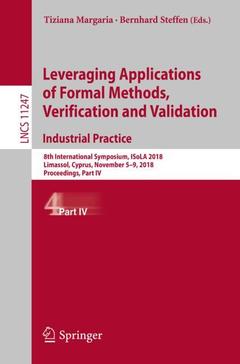Description
Leveraging Applications of Formal Methods, Verification and Validation. Industrial Practice, 1st ed. 2018
8th International Symposium, ISoLA 2018, Limassol, Cyprus, November 5-9, 2018, Proceedings, Part IV
Theoretical Computer Science and General Issues Series
Coordinators: Margaria Tiziana, Steffen Bernhard
Language: English
Subjects for Leveraging Applications of Formal Methods, Verification...:
Keywords
artificial intelligence; computer organisation systems; data security; formal logic; formal methods; Internet of Things (IoT); mathematics of computing; model checking; privacy; program compilers; programming languages; security systems; semantics; software engineering; software evaluation; specifications; theory of computation; verification
Support: Print on demand
Description
/li>Contents
/li>
The four-volume set LNCS 11244, 11245, 11246, and 11247 constitutes the refereed proceedings of the 8th International Symposium on Leveraging Applications of Formal Methods, Verification and Validation, ISoLA 2018, held in Limassol, Cyprus, in October/November 2018.
The papers presented were carefully reviewed and selected for inclusion in the proceedings. Each volume focusses on an individual topic with topical section headings within the volume:
Part I, Modeling: Towards a unified view of modeling and programming; X-by-construction, STRESS 2018.
Part II, Verification: A broader view on verification: from static to runtime and back; evaluating tools for software verification; statistical model checking; RERS 2018; doctoral symposium.
Part III, Distributed Systems: rigorous engineering of collective adaptive systems; verification and validation of distributed systems; and cyber-physical systems engineering.
Part IV, Industrial Practice: runtime verification from the theory to the industry practice; formal methods in industrial practice - bridging the gap; reliable smart contracts: state-of-the-art, applications, challenges and future directions; and industrial day.




